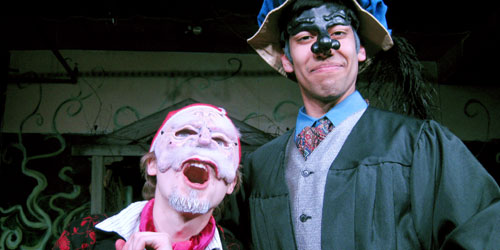
I imagine when the powers-that-be of a new theater company are sitting around a founder's living room and planning their opening show, the discussion likely centers around which well-known comedy or musical will best suit not only their slim budget, but also their mission statement. "What show will best introduce us to the world?" I bet someone asks. "And which will bring in the most people?"
Based on personal observations over the past 35-plus years, few decide to open with an Italian style of theater with roots that go back to the 14th and 16th centuries known as commedia dell'arte. Yet that's what TJ Corbett and his Hole in the Wall Theatre Company did Feb. 24 with "The Whole Vine Yards" at the recently renamed Elizabeth Theater above the Park Bar in Downtown Detroit.
For those unfamiliar with commedia – fully known as commedia dell'arte all'improvviso – the name can be translated to mean "comedy of the craft of improvisation" or "comedy of professional artists." And that makes total sense, since commedia is credited by experts as the "first entirely professional form of theater" – and the first to use women in women's roles. These troupes roamed the cities and towns of Italy (and, later, throughout much of Europe) putting on comedies that commented on the contemporary issues of the day, such as politics, religion and juicy scandals, using only a basic plot outline as their guide; the rest was made up on the spot. (Sound familiar?)
But there's more.
Commedia is a highly stylized form of theater that utilizes "stock" characters to play specific roles such as the master, the servant and the lovers. Each is instantly recognizable, thanks to a unique style of exaggerated movement and distinctive costumes – and often a mask. Over time, these characters morphed into the familiar Pantalone (a gullible, but forgiving old shopkeeper from Vienna with an eye for the pretty ladies), the Doctor (an elderly, educated man from Bologna, oftentimes an absent-minded pedant), the Captain (a young and swashbuckling braggadocio), and the servants (or clowns) Arlecchino and Brighella.
Each of these appears in Corbett's storyline – as do a handful of others – which tells the story of Pantalone DiVinostro, a miserly owner of a vineyard whose ancient family wine recipes have been lost to time. As a result, the vineyard has fallen on hard times. But thanks to a prank played by Brighella on the not-so-bright son of Il Dottore Pazzofasullo, a long-hidden map surfaces and reveals the secret location of the recipes. Greed, however, soon takes control – and before you can shake your slapstick, multiple fake maps are created and everyone joins the hunt for the riches they assume will end up in their control.
Played in front of an audience that consisted of two critics, their guests and a handful of friends and family members (plus one woman who bravely sat in the front row and was rewarded by becoming a brief character in the show), "The Whole Vine Yards" is an earnest effort long in enthusiasm and talent, but a bit rough around the edges.
Pantalone, portrayed by Corbett (who also created the plot and directed the show), hews closest to the standard portrayal of a commedia character – and he never wavers from it. Ryan Moya is likewise consistent as Il Dottore.
The most delightful is Jordan Climie as Flavio. Although in the spot reserved for the Captain, Flavio is conceived here as a klutzy swordsman-wannabe – referred to as a sissy at one point – and his physical antics are the biggest laugh-generators of the night. And oddly enough, Arlecchino is less troublemaker or clown than he is a lover – but a few bits performed by Eric Kearns confused me regarding the character's sexuality. (I was also curious about the decision to cast a woman – the talented Sarah E. Jarrett – in the male role of Brighella, who is constantly referred to with masculine pronouns. Remember, commedia troupes were the first to cast women in women's roles, not men's.)
There are other inconsistencies as well. Characters in a commedia play are generally exaggerated and larger than life, and few reached or sustained that level on opening night. And while certain conventions are kept, others are purposely changed – such as Arlecchino's costume, which includes modern-day pajama bottoms. (If my memory serves me correctly, that was the only noticeable current-day costume piece in the play.) Even a few lines of dialogue took me out of the unnamed past period of the play and returned me to the present.
But more importantly, the "chase" to discover the recipes was anything but. I'm always leery when an author decides to not only be in his show, but also direct it – and this helps reveal why. The glacial pace leaves way too much dead space: There's no excitement, no intrigue, and very little is played for laughs – it's just people coming and going. Over and over. (I suspect if the chase had referenced commedia's progeny such as Bugs Bunny, The Marx Brothers or The Three Stooges as inspiration, my guest would not have fallen asleep at this point.)
So while there's much meat to dig into and develop, "The Whole Vine Yards" had not ripened enough on opening night to thoroughly enjoy all the tasty morsels Hole in the Wall Theatre Company attempts to serve at The Elizabeth Theater. But since the story unfolds through the magic of improv, I suspect by next weekend what audiences will see may bear little resemblance to what I saw on opening night.
That, dear readers, is what makes live theater so much fun! And that's why I love watching brave, new theater companies such as Hole in the Wall Theatre Company spring up, spread their wings, flex their muscles and grow into vibrant companies that make Southeast Michigan such an exciting place to experience the wonders of live theater.
REVIEW:
'The Whole Vine Yards'
Hole in the Wall Theatre Company at The Elizabeth Theater, 2040 Park Ave., Detroit. Through March 4. $20. 313-444-2294.










